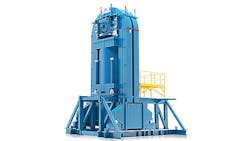Alcoa to Install Larger HIP System for Jet-Engine Parts
Alcoa has outlined another major investment in aerospace manufacturing capability, this time involving a $22-million hot-isostatic pressing system to be installed at Whitehall, MI, where it already operates eight similar systems. It calls Whitehall “one of the world’s largest HIP technology complexes for aerospace,” and it said the new installation would allow it to process its largest jet-engine parts isostatically.
The installation is expected to be available to begin qualifying finished parts by 2016. Alcoa did not indicate a supplier for the new installation.
Hot-isostatic pressing, or HIP, is a thermal forming process in which heat and pressure are applied simultaneously to semi-finished products (e.g., turbine blades, engine structural parts) in a controlled sequence, aiming to improve the mechanical and structural properties of the component. Alcoa said the investment would help it to address aerospace manufacturers’ "growing demand" for jet-engine components in titanium and nickel, as well as its own increasing volume jet-engine parts produced by 3D printing.
For 3D-printed parts, the HIP process can increase the material density of powdered metals, thereby achieving more strength and consistency, and promoting longer service life.
“All titanium, 3D-printed and some nickel parts used for jet engines must be treated using the HIP process,” according to Alcoa’s announcement.
Alcoa already operates eight similar systems at Whitehall, which it calls “one of the world’s largest HIP technology complexes for aerospace.” The Michigan operation process investment castings, though Alcoa operates an isothermal forging system at Midway, GA, a plant it acquired in its 2014 purchase of Firth Rixson Ltd.
Over the past two years Alcoa has invested billions in new manufacturing capabilities to supply aerospace customers with more and better jet-engine parts. It points to commercial jet manufacturing programs at Airbus and Boeing, as well as jet-engine manufacturers like GE Aviation and CFM International as evidence of rising demand for additional production capacity and process capabilities.
It also has acquired new capacity, including titanium producer RTI International Metals; aluminum and titanium investment caster Tital; as well as aeriospace forger Firth Rixson.
“As aerospace growth soars, Alcoa continues to invest in the latest technologies, creating added capacity to capture fast-growing demand,” stated exec. vice president Olivier Jarrault. “Combined with our expansions in LaPorte, IN, and Hampton, VA and our growing 3D printing capabilities, this investment will give Alcoa the broadest capabilities to deliver high-quality titanium, nickel and 3D-printed parts for the world’s bestselling jet engines.”
About the Author
Robert Brooks
Editor/Content Director - Endeavor Business Media
Robert Brooks has been a business-to-business reporter, writer, editor, and columnist for more than 20 years, specializing in the primary metal and basic manufacturing industries. His work has covered a wide range of topics including process technology, resource development, material selection, product design, workforce development, and industrial market strategies, among others.
Currently, he specializes in subjects related to metal component and product design, development, and manufacturing—including castings, forgings, machined parts, and fabrications.
Brooks is a graduate of Kenyon College (B.A. English, Political Science) and Emory University (M.A. English.)

